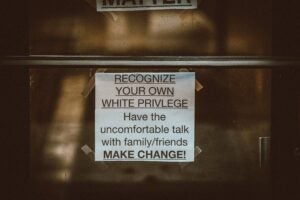 I was in a conversation a few months ago with a friend and colleague from the Health and Human Services Commission. She is a black woman I have known and worked with for a number of years, and we were talking about racism, inequities, and disparities. She said something to me that I have been thinking about ever since. She said, “Colleen, I can’t fix this. It’s people who look like you who can.” I told her that I understood that but that I struggled with what that role even looks like. Her reply was, “at least you are struggling with it…that’s where it begins.”
I was in a conversation a few months ago with a friend and colleague from the Health and Human Services Commission. She is a black woman I have known and worked with for a number of years, and we were talking about racism, inequities, and disparities. She said something to me that I have been thinking about ever since. She said, “Colleen, I can’t fix this. It’s people who look like you who can.” I told her that I understood that but that I struggled with what that role even looks like. Her reply was, “at least you are struggling with it…that’s where it begins.”
So this is a message to my white girlfriends – those I know and those I have yet the privilege to meet. I ask that you join my struggle. For those who have questioned our white privilege, I offer you this. The existence of institutional or systemic racism does exist. It does not make us bad people, but it requires us to participate in the remedy. It doesn’t mean that we haven’t faced hard times, suffered trauma, or struggled. It does, however, mean that we likely have never experienced those things because of the color of our skin. And, it does mean that the social support systems that surround us were built primarily to help people that look like us. We have often taken those things for granted — quality education, decent housing, social services, doctors who listen to us, therapists that understand our experience, grocery stores close by, a credit card in our pocket, and so much more.
I have to admit, that I too had been asleep. I have always had black friends and assumed that proved that I was part of the solution and not the problem. I didn’t think racism existed in my world. I didn’t know what I didn’t know. I taught my children that we all are “equal” and that they were no better or worse than others based on the color of their skin. I tried to teach them that our value comes from the heart. However, I didn’t teach them enough, because I didn’t know enough. I “knew” about the tragedy of slavery from the history books, but I didn’t know the history of housing discrimination, health care discrimination, and political discrimination or the generational trauma all this caused. I didn’t know about the institutional racism that I am a part of and have benefitted greatly from. I wasn’t paying attention.
This past year I have read, reflected, attended diversity trainings, and tried to listen and learn. At one of those trainings, I sat knee-to-knee with a Black woman who told me just a small piece of her story. I remember the exhaustion in her eyes. I knew I could never know her pain or her unrelenting fear. I left that day changed simply by realizing that the things she had to teach her sons to keep them alive are things I never had to teach my sons.
There’s lots of data, research, and analysis that provides the evidence that systemic racism is embedded in our country and our culture, but the question really is, what do we do about it? The answer will be different for all of us. The key is that we learn the history of institutional racism and recognize that it does in fact still exist. If you think that white privilege went away with the “Whites Only” restrooms, you are wrong. If you think that voting rights became equal when we so “graciously” allowed black people to vote, you need only look at recent events in Texas to know that is not true. If you think our white sons face the same dangers as young black men, you are asleep.
Most of the women I know are truly compassionate, strong, and are spiritually grounded. Hopefully, we can wake up and use our gifts to help steer a course of correction. We can be willing and open to admit that institutionalized racism exists and we can participate in needed systems change. We can encourage and initiate difficult conversations. We are the mothers and grandmothers who can empower our youth to do more than simply respect our differences, but also to challenge the status quo. We can and must discover how we can contribute to a different future by declaring that change is required, not optional. We must continue to listen, learn, and then act contemplatively. As my friend said, we must be willing to struggle. The conviction of Derek Chauvin was the correct verdict, one that brought relief to many of us. We cannot, however, rest in that relief and falsely assume the world has changed. Claiming ignorance is no longer an option, we know too much.
